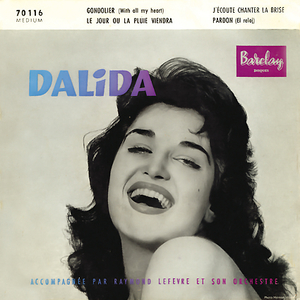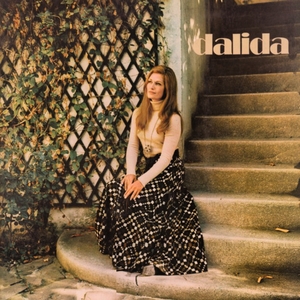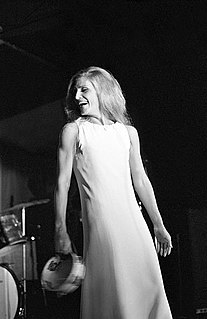
Iolanda Cristina Gigliotti, professionally known as Dalida, was a French singer and actress, born in Egypt to Italian parents. Singing in 10 languages, she is the most internationally successful French performer of all time. Her diverse repertoire and heartfelt interpretations of both sentimental ballads and pop music have brought her adoration by mass audiences and by politicians and intellectuals alike.

Henri Salvador was a French Caribbean comedian, singer and cabaret artist.

Son nom est Dalida is the debut studio album by French vocalist Dalida. It was released in December 1956 through Barclay Records.
"J'attendrai" is a popular French song first recorded by Rina Ketty in 1938. It became the big French song during World War II; a counterpart to Lale Andersen's Lili Marleen in Germany and Vera Lynn's We'll Meet Again in Britain.

Génération 78 is a Dalida EP, recorded in duet with, as special guest, Bruno Guillain, was recorded in 1978 and was a radio/club disco hit.

Gondolier is the eighth EP by French vocalist Dalida. It is named after the title song "Gondolier" that was her second major hit after Bambino. This EP was released on Christmas 1957, soon after her second album Miguel. Reaching No. 1 on both the La Bourse des Chansons chart and the Music Hall chart in France, it was the title song for Dalida's 1958 album Gondolier. The song also reached No. 1 on the Belgian and Canadian charts.

Gondolier is the third French language studio album by French singer Dalida. The album contains Dalida's second #1 hit, the famous exotical Gondolier. The album contains other minor hits such as "Buenas noches mi amor", "Histoire d'un amour" and the pop-rock oriented "Le jour où la pluie viendra".

Les Gitans is the fourth studio album by French-Italian singer Dalida, released by Barclay Records, catalogue number 80 094, in 1958. In 2002, Sammel released a remastered version in CD and 10" (25 cm) vinyl record (LP), catalogue number 981 109-7. In 2004, Universal Records released a remastered CD, catalogue number 981 108-5, as part of a compilation containing re-releases of all of Dalida's studio albums recorded under the Barclay label.

Love in Portofino is a 1959 song recorded by French singer Dalida, with lyrics in Italian and French language although the name is in English. The song was her minor hit upon its release for Dalida, and was covered by several other singers, including Gloria Lasso under the name "A San Cristina", and in instrumental versions by accordionists and conductors. Being embraced by musical intellectuals as masterpiece of Dalida's early repertoire and pop standard of 1950s, it eventually became the symbolic song for Portofino, to which it is referring.

"Paroles, paroles", is a song by French singer Dalida featuring French actor Alain Delon. It was released on 17 January 1973 as the lead single from her upcoming album Julien (1973). Lyrics describe the conversation of a man offering a woman "caramels, bonbons et chocolat" followed with shower of compliments, to what she says they mean nothing to her because they are just "paroles" – empty words. The song achieved big success in France and internationally, especially in Japan and Mexico, becoming one of the most recognizable French songs of all time. The first video clip was released in 2019, over 46 years after the songs's release.

This album of Dalida went with a wind of changes in her career: the 1970s are coming, the label is no more Barclay Records but her brother Orlando's International Shows, then she is also changing her style for a more mature adult contemporary music. The success of this album is the proof: the Greek folklore summer hit "Darla dirladada", "Ils ont changé ma chanson" or "Lady d'Arbanville".

Dali is a French-language album released in 1984 by French singer Dalida.

Bambino is a song recorded by French singer Dalida that became her first major hit. It was first released on 28 October 1956 as title song of her third EP, prior to her debut album Son nom est Dalida. Bambino spent 45 weeks atop the French song charts, becoming the longest-running number one song in world history.
"Manhã de Carnaval" is a song by Brazilian composer Luiz Bonfá and lyricist Antônio Maria.
"The Way of Love" is a song written by Jacques Dieval, with lyrics by Al Stillman.

"Le temps des fleurs" is a song by French singer Dalida for her twenty-first studio album of the same name. While the French lyrics were written by Eddy Marnay, the melody was taken from Russian romance song "Dorogoi dlinnoyu", composed by Boris Fomin in 1924. Dalida covered the song after Mary Hopkin popularised the original with her English version one month earlier.
"Shame and Scandal in the Family", also known as "Shame & Scandal" for short, is a song written by calypso singer Sir Lancelot for the movie I Walked with a Zombie in 1943 and originally titled "Fort Holland Calypso Song". Sir Lancelot issued his recording of it in the late 1940s. The Sir Lancelot version was covered by folksingers Odetta and Burl Ives. In 1962, Trinidadian calypsonian Lord Melody wrote new lyrics for the verses while keeping the melody and the chorus. The Historical Museum of Southern Florida said of Lord Melody's version that "No calypso has been more extensively recorded".

"Darla dirladada" is a traditional song, originating from the island of Kalymnos in Greece.

French singer Dalida has released forty-one studio album, twenty-one compilation album, five live albums and one soundtrack album. In 1956 Dalida signed a recording contract with Barclay Records, a label owned by Eddie Barclay. Orlando became her producer which resulted signing recording contract with Orlando. He still holds copyright on her releases and re-releases.
French singer Dalida signed a recording contract with Barclay Records, a label owned by Eddie Barclay, in 1956. In late 1960s, her brother Orlando became her producer which resulted signing recording contract with Orlando Productions in 1970. Under those two recording houses, she recorded up to 700 songs in 9 different languages and in her name was released more than 500 different records in various audio formats.















